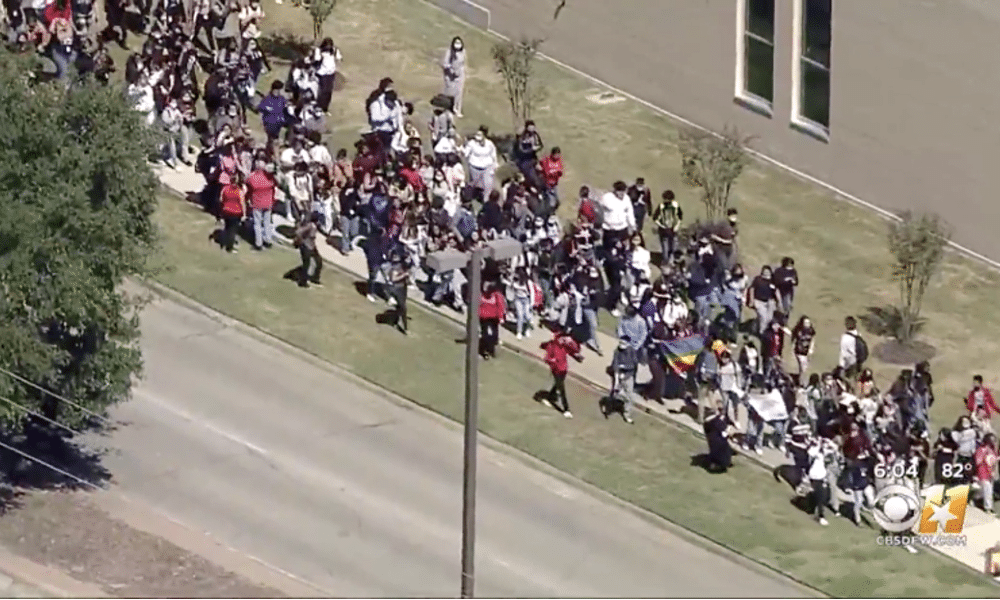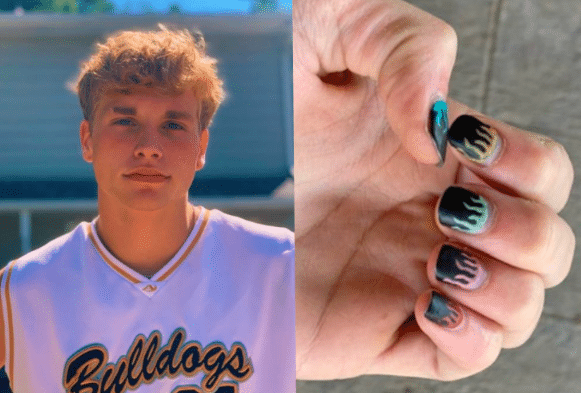Defiant wave of LGBT+ student walkouts are hitting schools where it hurts

Temple High School students protesting in support of a trans classmate (Instagram/@johnny_salami17)
Students across America are staging mass walkouts to protest LGBT+ hate in the education system, and schools are finding them harder and harder to ignore.
Three LGBT+ protests happened in September alone – the first at Winterset High School in Iowa where more than a hundred students walked out to protest the suspension of a teacher who revealed he was bisexual.
Then there was MacArthur High School in Texas, where crowds of students were seen pouring out of class in response to the school’s alleged “targeted discrimination” against LGBT+ children and teachers.
And just a few days ago scores of students at Temple High School in Texas took a stand for a trans classmate who was blocked from using the girls’ locker room and bathrooms.
The walkouts themselves are nothing new – students have been protesting this way for over 50 years, and not all of the protests centre on LGBT+ issues. In recent weeks students have also held walkouts over campus safety, racism, and bullying.
But protests against anti-LGBT+ policies are becoming more and more common, according to Frederick Heather, advocacy and education manager for Out Youth’s Texas Gay Straight Alliance Network – and they’re hitting officials where it hurts.
“The schools are paid based on how many students are in seats. And so if the students are not in seats, it directly affects the school’s income,” they explained to PinkNews.
“What it boils down to is how many students you have in the classroom on a given day, how many students you have graduate, how many students you have pass the standardised test. All of those things directly impact the funding that the schools get.
“The students, kind of like union workers, are coming to realise that you have the power and the right to make these demands, especially for something like your safety and wellbeing in your classroom.”

Students walk out in defence of their lesbian teacher at MacArthur High School in Irving, Texas (Screenshot: DFW News)
While these walkouts may seem dramatic, they’re sometimes the last option for students who have tried and failed to have their concerns heard by school administrators.
The GSA Network works directly with students to arrange petitions and “teach-ins” to help mediate problems before they escalate. It’s one of the reasons LGBT+ bullying is significantly lower in schools with a Gay Straight Alliance club.
But all too often students are ignored or dismissed, particularly in Southern states where anti-LGBT+ sentiment already runs strong. In areas like these anti-LGBT+ policies can literally mean life and death for queer youths – and that’s when walkouts become necessary.
The addition of media coverage adds another fear for schools who risk having their dirty laundry thrust into the public eye. The children know this, and are using it to their full advantage.
“Nobody wants bad press, and when you are in the media for discriminating against your students and your staff, that is awful for schools,” Heather said.
“It perpetuates the most negative stereotypes about Texas that there are, and they don’t want that. And so I think students are realising the power of their voice and the power of being the ones to control the narrative.”
One of the most high-profile fights in recent months came from gay teenager Trevor Wilkinson, who received an indefinite suspension from his Texas school for wearing nail polish.
He raised a petition, spoke at school board meetings and was even interviewed on Good Morning America, until finally the school agreed to introduce a gender-neutral dress code. It was no small feat, and many others haven’t been as successful.

17-year-old Trevor Wilkinson was suspended for violating his school’s “homophobic” dress code. (Instagram/trevormichae1)
“Trevor being the face of nail polish on boys in Texas is fantastic,” Heather said, “but it’s important to see that he’s a cisgender, white, gay boy.
“There’s a reason that a Black trans girl hasn’t become the face of the movement, and it has a lot to do with misogynoir and all the systems of oppression that work together to keep people down.”
But students are leaning into their power when they can, and slowly school administrations are starting to realise that they ignore this fight at their peril.
“When I’m hearing students say they’re getting death threats after coming out… [it’s clear that] the creation of safe spaces is literally life saving. And for the schools to say it’s political, like it’s an opinion, it’s just maddening,” Heather said.
“I hope that the principals and administration and superintendents have the good sense to listen to these students when they’re demanding safe schools and safe classrooms, because they absolutely deserve those things.”

